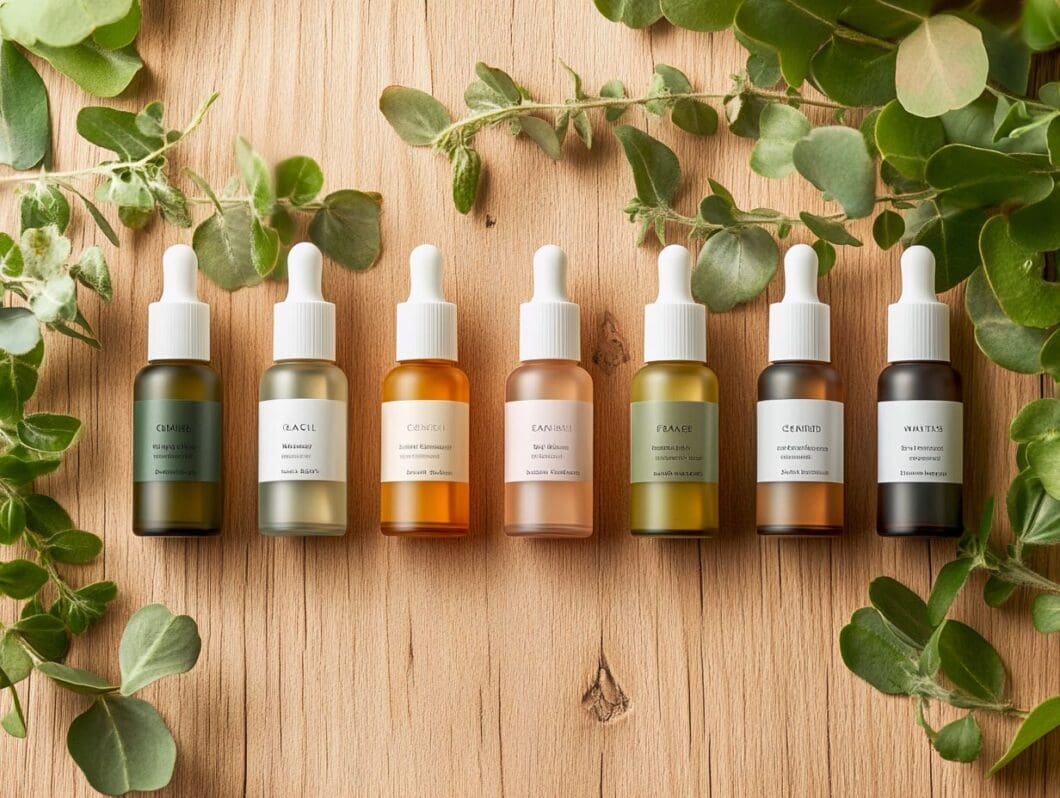Facial serums have become a skincare staple for good reason—they deliver concentrated ingredients that target specific skin issues more effectively than traditional moisturizers.
This article explores what facial serums are and how they differ from moisturizers.
You’ll learn how to select the right serum tailored to your unique skin concerns, discover key ingredients to look for, and find top recommendations for various skin issues, from anti-aging to acne-fighting.
Additionally, tips will be shared on how to seamlessly incorporate serums into your daily routine. Get ready to elevate your skincare game!
Key Takeaways:
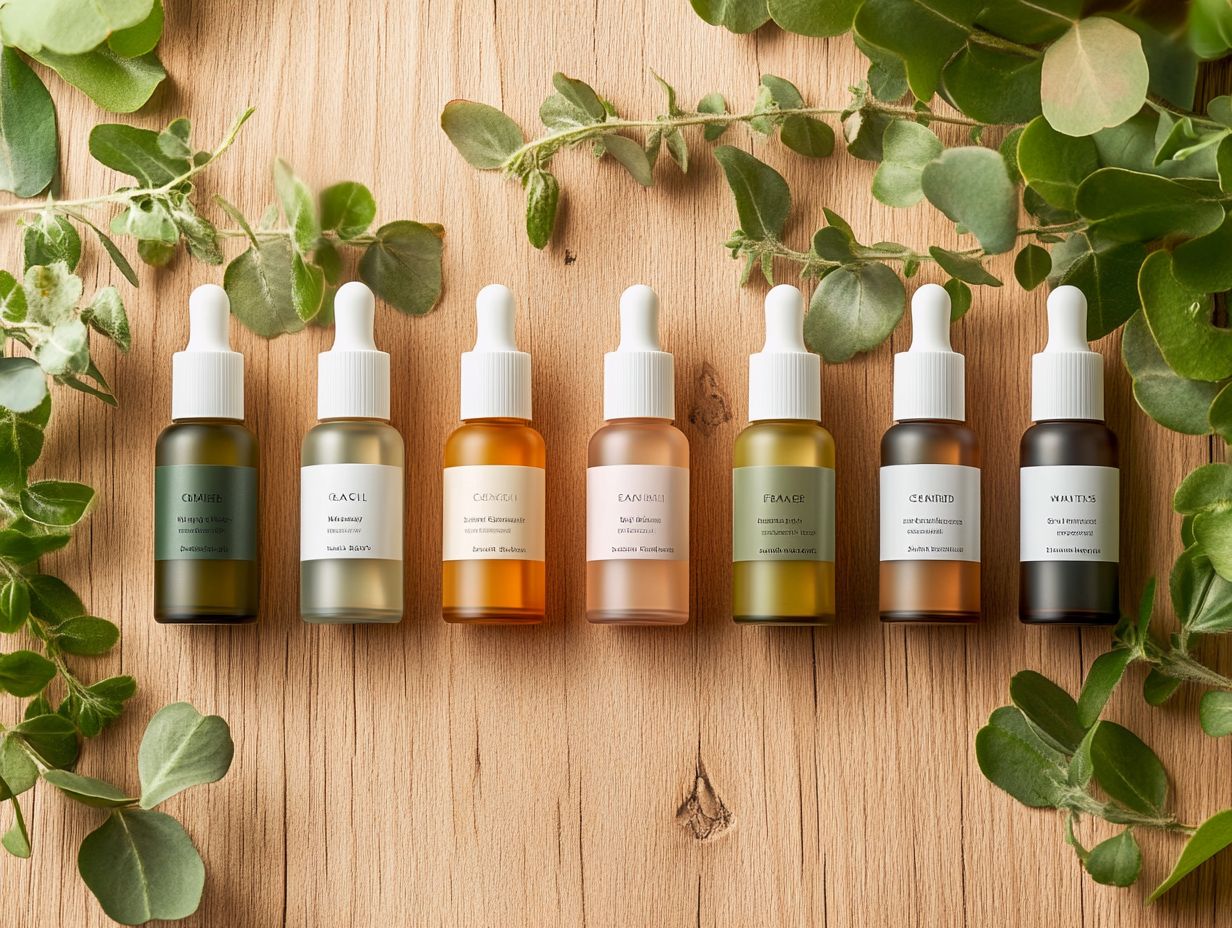
Understanding Facial Serums
Understanding facial serums is crucial for individuals seeking to improve their skincare regimen. These highly concentrated formulations are specifically designed to address particular skin concerns, such as fine lines, acne-prone skin, or hydration requirements.
With elevated concentrations of active ingredients like vitamin C and hyaluronic acid, facial serums can penetrate deeper layers of the skin, offering more effective treatment than traditional moisturizers. Beauty professionals and dermatologists advocate for the inclusion of serums in daily skincare routines to achieve noticeable results and effectively address the unique needs of various skin types and concerns.
What are Facial Serums?
Facial serums are lightweight, rapidly absorbing formulations that contain high concentrations of active ingredients specifically designed to address various skin concerns. These specialized products represent a significant enhancement to a skincare routine, delivering targeted treatment for issues such as dryness, acne, and signs of aging.
Typically composed of either water-based or oil-based formulations, serums often include potent active ingredients, such as hyaluronic acid for hydration, vitamin C for brightening, and niacinamide to address blemishes. Each ingredient is meticulously selected based on its effectiveness for different skin types, ensuring that individuals with oily, dry, or combination skin can identify a serum that meets their specific needs.
Incorporating a facial serum into one’s skincare regimen can elevate the overall effectiveness of the routine, facilitating a more personalized approach to achieving healthy, radiant skin.
How are They Different from Moisturizers?
Both facial serums and moisturizers play essential roles in skincare, though they serve distinct purposes and feature different formulations. Serums are characterized by high concentrations of active ingredients, while moisturizers primarily focus on hydration and the protection of the skin barrier.
Serums typically possess a lighter texture, enabling them to penetrate deeper into the skin for targeted treatments, such as addressing issues related to pigmentation, fine lines, or acne. In contrast, moisturizers are generally thicker, forming a protective layer that retains moisture and shields the skin from environmental stressors.
For example, after applying a serum that contains vitamin C for brightening, following up with a moisturizer can enhance the overall benefits, ensuring that the active ingredients are adequately supported. Consequently, incorporating both products into a skincare regimen can optimize results, allowing individuals to achieve a balanced and healthy complexion.
Choosing the Right Facial Serum for Your Skin Concern
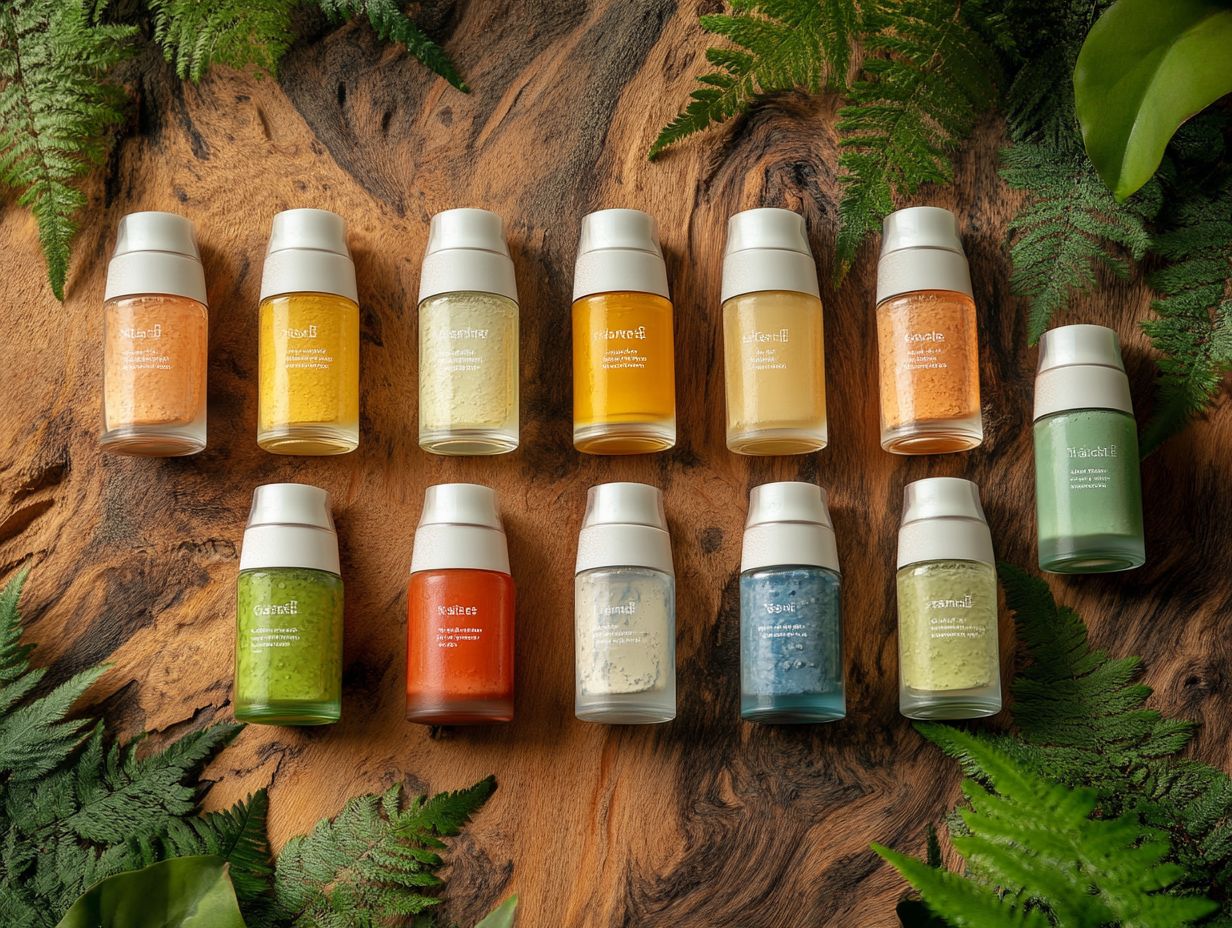
Selecting an appropriate facial serum for specific skin concerns is essential for achieving optimal skin health and appearance. Given the vast array of options available, it is crucial to ascertain one’s unique skin type and concerns.
Whether addressing fine lines, acne-prone skin, or seeking to enhance complexion brightness, a thorough understanding of the active ingredients in various serums is vital for making an informed choice. Notable ingredients such as vitamin A derivatives, salicylic acid, and vitamin C have been shown to effectively target specific issues. For more insights, check out the Top 10 Facial Serums for Every Skin Concern.
Therefore, it is advisable to consider customer reviews and recommendations from beauty professionals to facilitate the selection process.
Identifying Your Skin Concerns
Identifying skin concerns is the initial step in selecting an appropriate facial serum, as different skin types necessitate tailored solutions to address specific issues such as acne-prone skin or fine lines.
To commence this assessment, one should first ascertain their skin type, which may range from oily to dry, or even combination. A straightforward method involves cleansing the face and observing its condition after a few hours. Is there a sensation of tightness, or does the skin feel oily?
Evaluating specific concerns, such as uneven texture or redness, provides a more comprehensive understanding of individual skin needs. Recognizing these nuances not only aids in pinpointing the precise issues but also plays a vital role in selecting serums that contain the appropriate active ingredients designed to deliver targeted relief and nourishment, ultimately resulting in healthier skin.
Ingredients to Look for in a Serum
When selecting a facial serum, it is essential to consider the active ingredients that address specific skin concerns. Popular options include vitamin C serums, which are known for their brightening effects, and hyaluronic acid, recognized for its hydrating properties.
Niacinamide is particularly effective in reducing redness and improving uneven skin tone, making it an excellent choice for individuals experiencing acne or rosacea. For those seeking anti-aging benefits, retinol can significantly enhance skin texture and minimize fine lines by promoting cell turnover.
It is also crucial to be aware of the concentrations of these ingredients; for example, a higher percentage of vitamin C may yield faster results but could also lead to sensitivity in some individuals. By carefully reading labels, one can ensure that they select a product that not only meets their specific needs but is also formulated to maximize efficacy.
Top 10 Facial Serums for Common Skin Concerns
Navigating the realm of facial serums can be daunting; however, understanding the top products that target prevalent skin concerns can significantly enhance one’s skincare regimen.
Presented here are ten highly recommended facial serums designed to address specific issues such as hydration, anti-aging, and acne. Formulated with ingredients including vitamin C, hyaluronic acid, retinol, glycolic acid, and salicylic acid, these serums have garnered the endorsement of dermatologists and beauty professionals for their efficacy in meeting a wide range of skincare needs.
Anti-Aging Serums
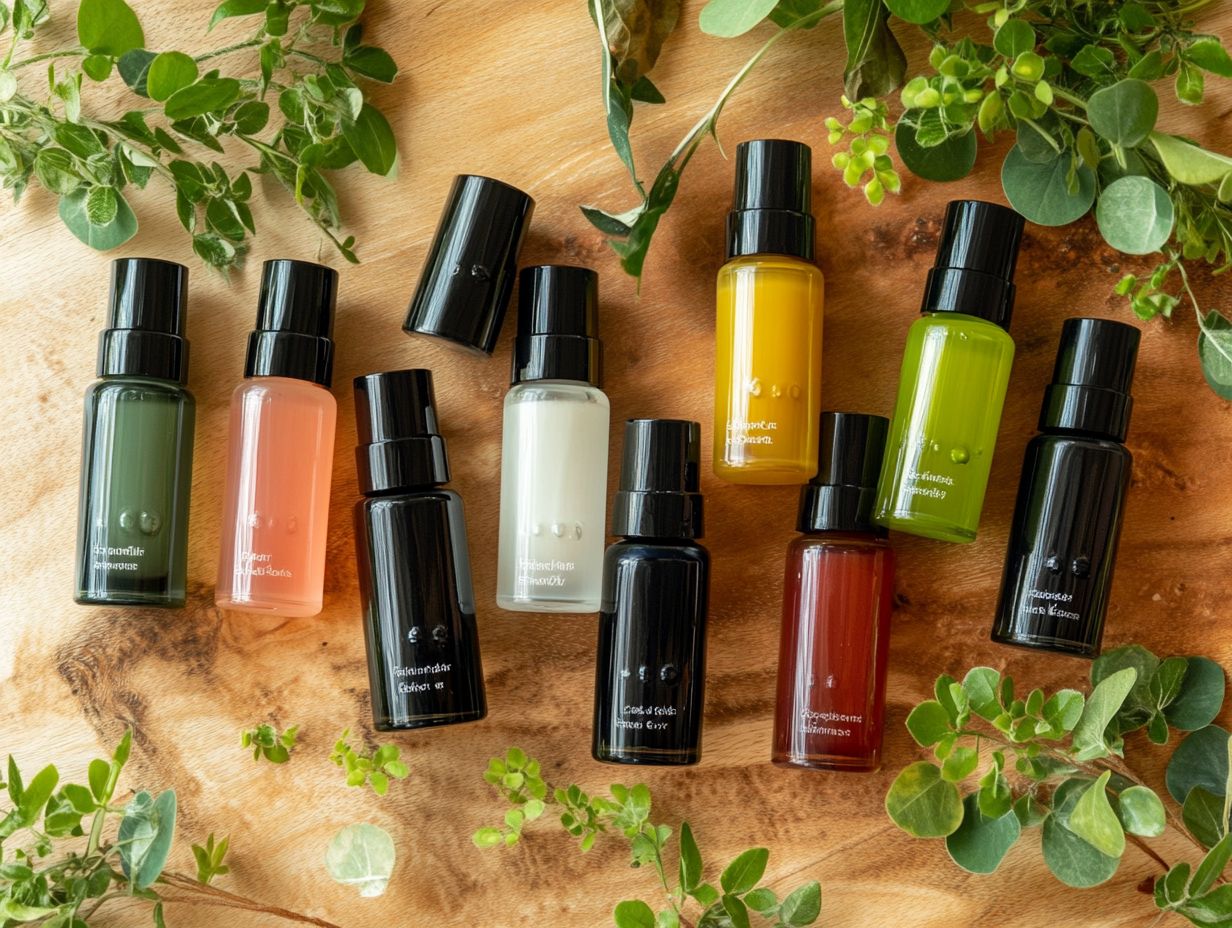
Anti-aging serums are formulated to address the visible signs of aging, including fine lines and wrinkles, by incorporating potent ingredients such as retinol and other skin-active compounds that stimulate collagen production.
These formulations not only enhance skin texture but also improve elasticity and hydration. Key ingredients, such as hyaluronic acid and peptides, play a crucial role in this rejuvenation process by attracting moisture to the skin and facilitating cellular renewal.
Numerous individuals seeking a more youthful appearance have gravitated towards well-regarded serums, such as Neutrogena’s Rapid Wrinkle Repair and Skinceuticals’ C E Ferulic, both of which receive high recommendations from dermatologists.
These products have demonstrated significant effectiveness in diminishing the visible signs of aging, resulting in a smoother and more radiant complexion for users.
Hydrating Serums
Hydrating serums are crucial for maintaining optimal skin moisture levels, often containing ingredients such as hyaluronic acid, which can retain several times its weight in water, thereby ensuring that the skin remains plump and adequately hydrated.
The importance of these serums extends beyond basic hydration; they also play a significant role in combating dryness, minimizing the appearance of fine lines, and reducing dullness, all of which contribute to a more youthful appearance. Hydrating serums are designed to penetrate deeper layers of the skin compared to traditional moisturizers, delivering potent active ingredients precisely where they are most needed. For the best options available, check out the Top 10 Facial Serums for Every Skin Concern.
For example, glycerin is an effective component that attracts moisture from the environment into the skin, further enhancing hydration levels.
Customers frequently express satisfaction with popular products such as The Ordinary’s Hyaluronic Acid 2% + B5 and Neutrogena’s Hydro Boost Serum, both of which are highly regarded for their transformative effects on skin texture and moisture retention.
Brightening Serums
Brightening serums are specifically formulated to even out skin tone and enhance luminosity, with vitamin C recognized as a key ingredient known for its efficacy in addressing dullness and pigmentation.
These potent formulations typically contain a combination of powerful antioxidants and ingredients such as niacinamide and kojic acid, which work collaboratively to target and reduce the appearance of dark spots. Many users report significant improvements in skin clarity and texture following regular application, making these serums a fundamental component of effective skincare routines.
Experts often recommend selecting reputable brands that utilize stable forms of vitamin C to ensure optimal effectiveness. Additionally, the hydration provided by these serums contributes to overall skin health, resulting in a more radiant and youthful complexion.
Acne-Fighting Serums
Acne-fighting serums are specifically formulated to target blemishes and prevent breakouts, often incorporating active ingredients such as salicylic acid, which penetrates deeply to unclog pores and reduce inflammation.
These serums are integral to skincare routines for individuals with oily and acne-prone skin, as they not only address existing imperfections but also play a significant role in preventing future occurrences. By including additional active ingredients such as benzoyl peroxide and niacinamide, these formulations can further assist in minimizing excess oil production and enhancing skin texture.
Dermatologists frequently recommend products containing tea tree oil and retinoids due to their antibacterial properties and their effectiveness in promoting cell turnover. Customer reviews consistently emphasize the efficacy of these serums in reducing redness and improving overall skin clarity, establishing them as essential components for achieving smoother and healthier-looking skin.
Sensitive Skin Serums
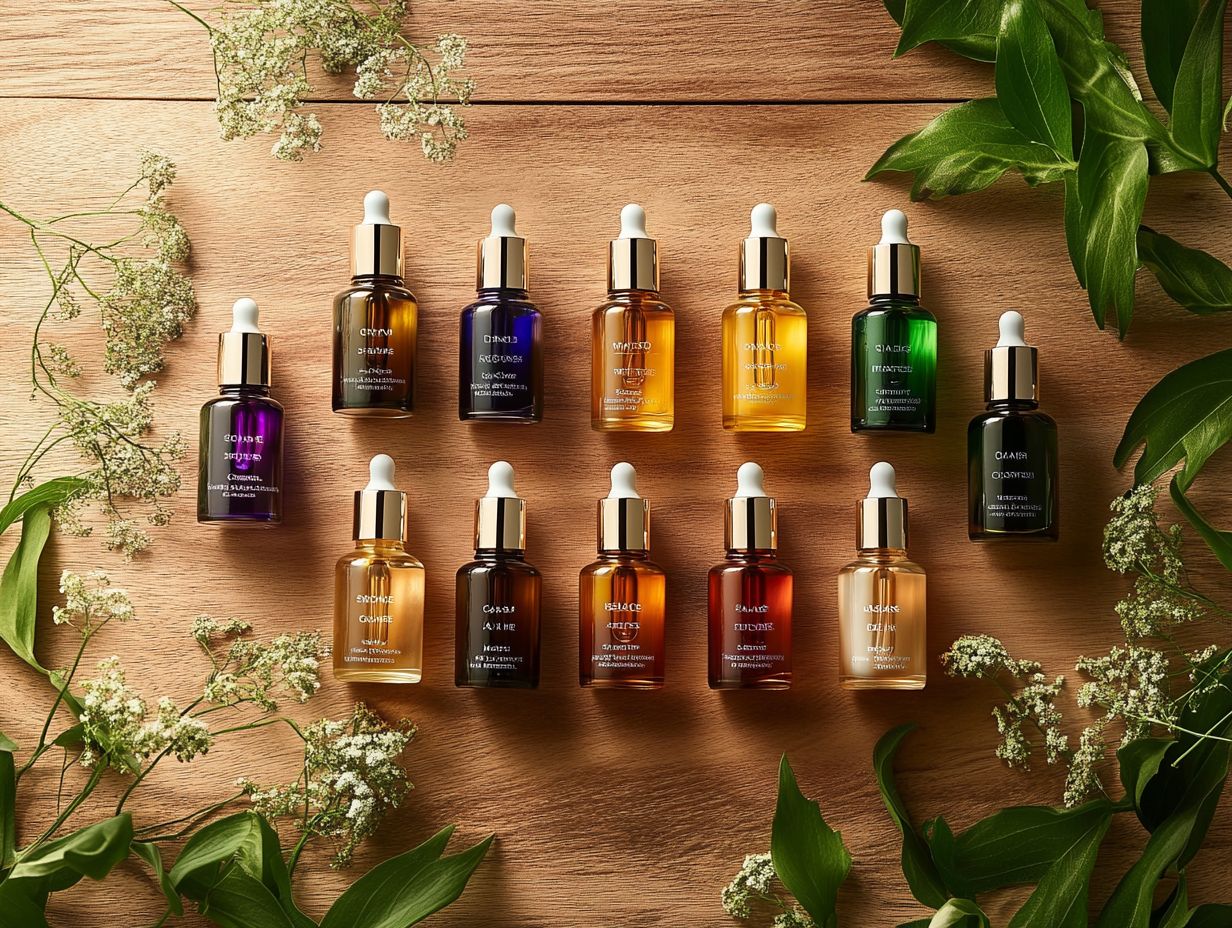
For individuals with sensitive skin, selecting the appropriate serum is essential, as soothing moisturizers and calming ingredients can effectively alleviate irritation and redness while maintaining overall skin health. For recommendations, check out the Top 10 Facial Serums for Every Skin Concern.
The right formulations can substantially impact both comfort and appearance. Dermatologists frequently highlight the significance of choosing serums that are enriched with gentle, plant-based ingredients such as chamomile, aloe vera, and calendula, which are known for their natural anti-inflammatory properties.
These soothing components not only provide hydration but also serve as a protective barrier against environmental stressors. Popular formulations that incorporate these key ingredients, including those featuring hyaluronic acid and niacinamide, are highly recommended for their efficacy in nurturing sensitive skin.
Ultimately, individuals should seek products that are free from harsh chemicals to ensure optimal skin harmony and wellness.
How to Incorporate Facial Serums into Your Skincare Routine
Incorporating facial serums into a skincare routine can significantly enhance skin health; however, it is crucial to understand the proper application techniques and frequency of use to maximize their benefits.
Begin by cleansing the skin with effective cleansers, then apply a few drops of the selected serum to targeted areas, allowing it to absorb completely prior to layering with a soothing moisturizer or other products.
Consistency is essential, so it is advisable to adhere to a daily regimen tailored to one’s specific skin type and concerns.
Application Techniques
The proper application techniques are essential when utilizing facial serums, as they ensure that the active ingredients effectively penetrate the skin layers for optimal benefit.
To achieve the best results, it is advisable to use gentle patting motions instead of aggressive rubbing. Patting encourages deeper absorption of the serum while minimizing potential irritation to the skin. Additionally, beginning with clean hands is crucial, as this practice prevents the introduction of impurities that could clog pores.
Incorporating tools such as jade rollers or gua sha stones can further enhance absorption and promote circulation. When layering products, it is recommended to apply a serum following cleansing and prior to heavier moisturizers, thereby creating a more effective skincare regimen. For recommendations, check out the Top 10 Facial Serums for Every Skin Concern.
It is also prudent to allow a few moments for each product to settle before proceeding to the next step.
Frequency of Use
The frequency of serum application can vary based on individual skin concerns and the specific formulation. Some serums are designed for daily use, while others may be recommended for application several times a week.
To effectively navigate this process, individuals should begin by identifying their skin type and any specific issues they wish to address, such as dryness or fine lines. It is often advantageous to introduce serums gradually into one’s skincare routine, starting with use once or twice a week. This method allows the skin to acclimate and minimizes the risk of irritation.
Clear indicators of overuse may include redness, excessive dryness, or breakouts, suggesting that it may be prudent to reduce the frequency of application or consider an alternative product. Additionally, educating oneself about the active ingredients in each serum can offer valuable insights into the appropriate frequency of use.


